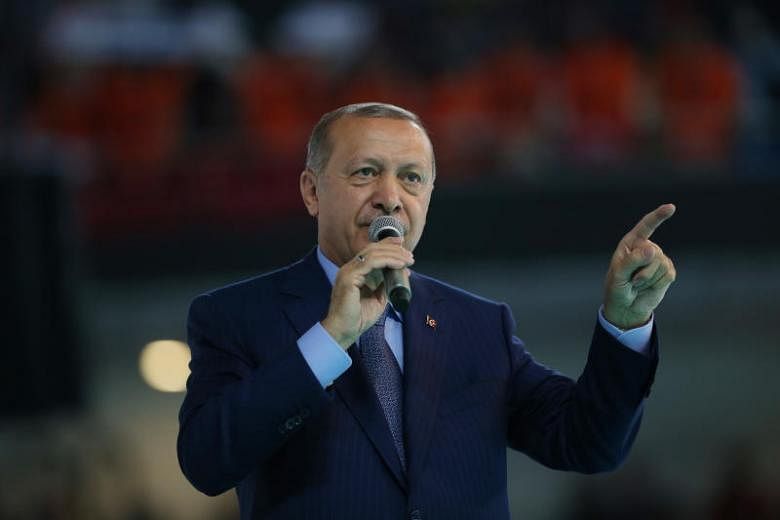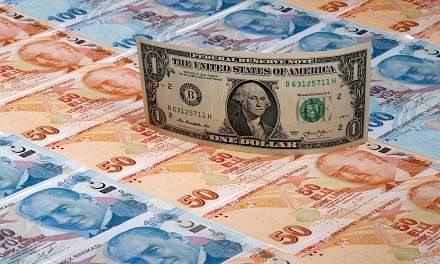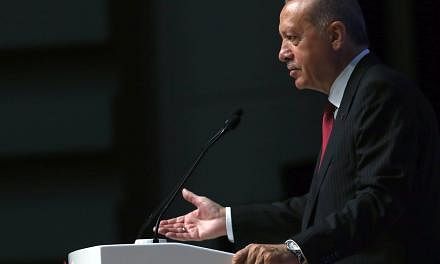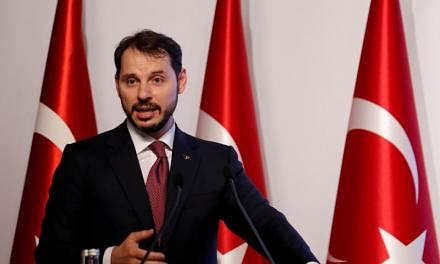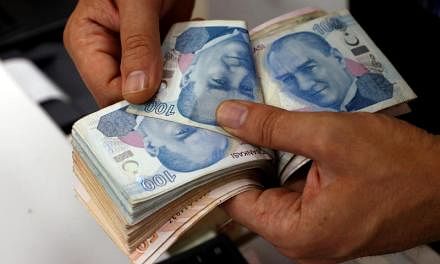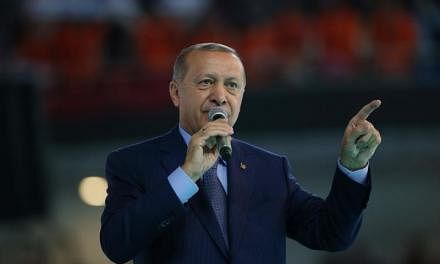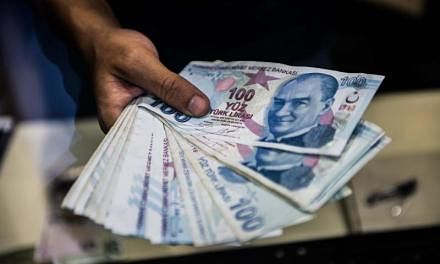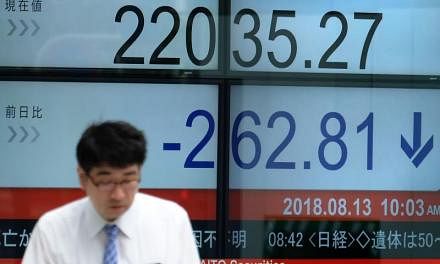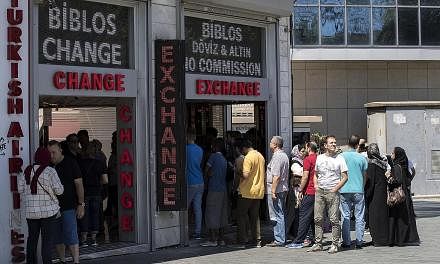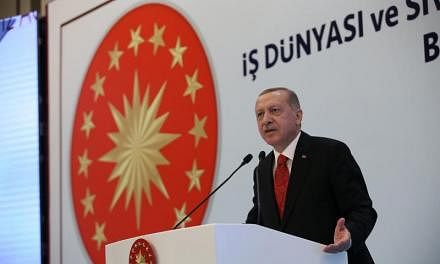ANKARA (BLOOMBERG) - Even in Recep Tayyip Erdogan's Turkey, patriotism has its limits.
As economists speculate on the policymakers' range of options in the face of a market meltdown, Turks are throwing in the towel on their national currency.
President Erdogan's repeated calls for citizens to convert their considerable foreign-exchange deposits to support the lira are falling on deaf ears. Anyone who obeyed those pleas in the past lost money. And at the heart of Istanbul's merchant capital, in the world's oldest covered market, there are signs that it's starting to damage his credibility and chip into his support.
"I have respect for our president, but I can't sell my gold and foreign currency just because he made that call," said Mr Sevin Temur, a 58-year-old retiree. "I've cut down on food for those savings."
For a leader who prides himself on having made Turks more prosperous during his 15 years in power, Mr Erdogan's failure to back his lira demands with any policy action comes as a surprise, and a betrayal.
Since Mr Erdogan first began making the call in mid-December of 2016, the lira has been the world's worst currency, losing about half its value against the dollar and euro. Last Friday alone, the currency depreciated by 14 per cent.
"I've lost about one million liras," says 48-year-old jeweller Cahit Bas, referring to a figure that's worth about US$155,000 (S$213,000) now, but US$340,000 in mid-2016. "I think we're heading for a crisis even worse than the previous one."
Mr Bas noted that you wouldn't notice any signs of trouble if you were following the mostly government-controlled media, but said Turks were feeling it. Two merchants at the bazaar committed suicide in the past week alone, he said.
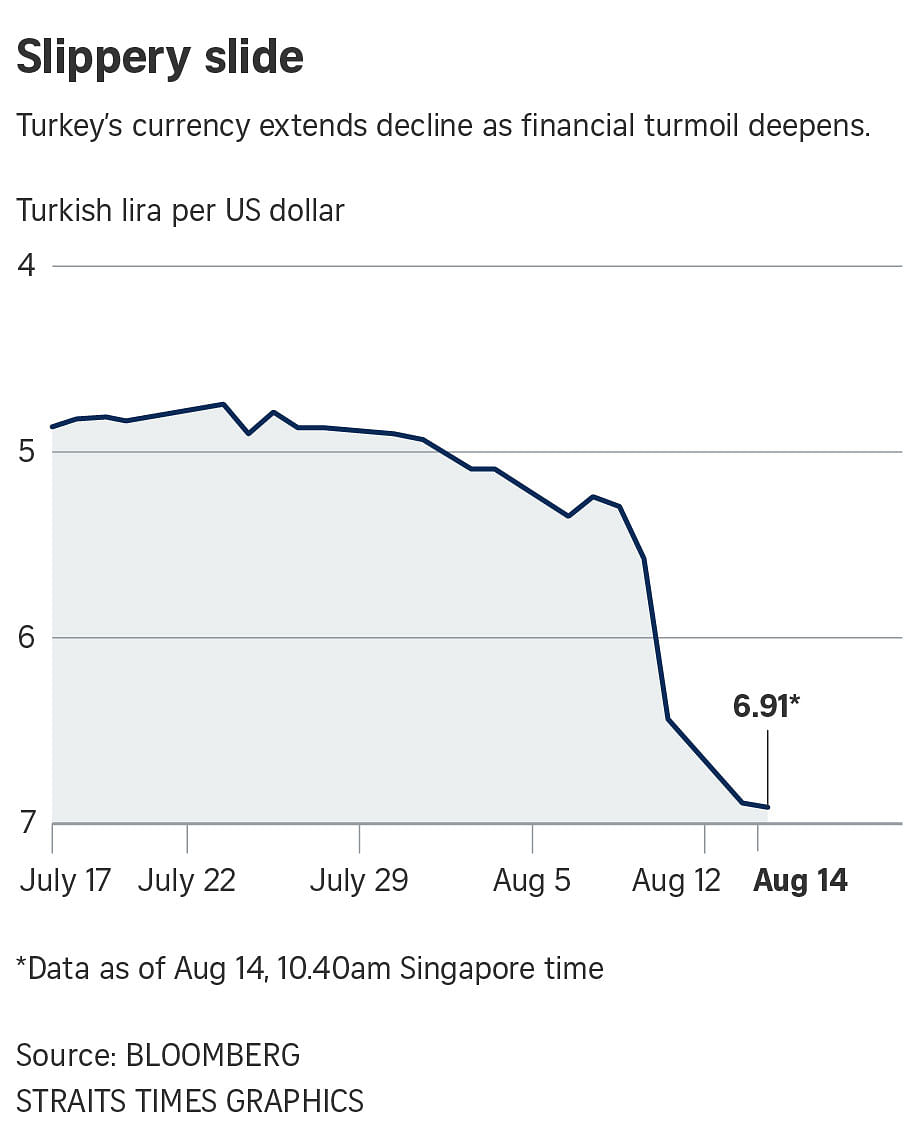
THE SON-IN-LAW
"I'm so regretful I didn't buy dollars, I feel like a fool," said Mr Bulent Ucuran, a 36-year-old shopkeeper. "When we have so many experienced people, leaving the entire economy to the son-in-law created insecurity," he added, referring to Mr Erdogan's decision to name his daughter's 40-year-old husband Berat Albayrak as minister of a newly combined treasury and finance ministry on July 9.
That appointment also unnerved international investors, who were used to dealing with steady hands on the economy even as Mr Erdogan's personal pronouncements became increasingly unpredictable and further outside the mainstream. And they didn't give Mr Albayrak much of a chance: Turkish bank shares dropped almost 20 per cent in the week after his appointment, and the lira 5 per cent.
US SPAT
Then a row with America made things even worse, ultimately triggering a currency plunge that risks turning into a full-blown financial crisis, according to investors.
Turkey's refusal to release American citizens and diplomatic employees imprisoned in the aftermath of a coup attempt against Mr Erdogan in 2016, including Pastor Andrew Brunson, led the United States to begin imposing sanctions earlier this month. More are likely to come if Turkey keeps them in jail.
"The economy was so bad anyway, then came the priest," said Mr Bas. "They should give up the priest immediately, they should have put him on the plane with the last delegation to the US and said: 'Here, take him.'"
His colleague Abdis Akbulut had similar sentiments about Mr Erdogan's managing of foreign affairs.
"Turkey's a very big country, but we can't fight with everyone in the international arena," he said. "You can't go out and fight one day with America and the next with Germany. Every outburst by Erdogan explodes on us."
Ms Basak Genc, 38, said she was trying to deal with the turmoil by pulling all of her money out of the bank.
"We couldn't get any foreign currency out yesterday: we wanted to take out US$50,000 but they directly said 'no,'" she said. "We couldn't carry out an EFT either," she said, referring to an electronic funds transfer.
But not everyone placed the blame on the government.
Mr Okan Aksut, 28, walked into the bazaar with a bag full of gold he was looking to exchange, both to take advantage of what he thought was a selling opportunity, and in response to Mr Erdogan's call. "If the lira goes to 10, it doesn't matter," he said. It traded at 6.43 to the dollar last Friday.
TURNING EAST
Mr Osman Sutuna, who sells items like rugs and cloth bags to tourists, said it was time for a wholesale revamp of Turkey's foreign policy that would divorce it from the West, in line with a camp of pro-government policy wonks who see the country's future as a leader in the Islamic world, rather than an aspiring member of the European Union.
Turkey should hold a referendum on leaving Nato, Mr Sutuna. "Doing business with the US is like sleeping with a python: you don't know when you're going to get bit."
He was interrupted by an eavesdropper from across the way.
"So we all deserve this, and from now on I'm going to vote for Erdogan - I'm going to sell everything I have to support him!" the person yelled sarcastically, declining to give his name out of fear of possible retribution. "Since you all want a caliphate, bring it on and let's all just relax about it."
